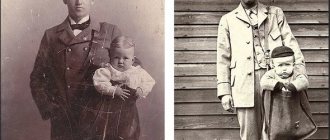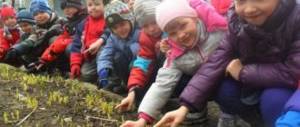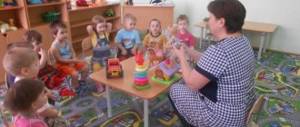Summary of an extracurricular activity with a presentation for teenagers on the topic: Politeness
Extracurricular activity for teenage children “Once again about politeness”
Target: Forming in children an understanding of the importance of a polite attitude towards people around them. Tasks: 1. repeat the rules of behavior, in public places, on the street, at home. 2. reinforce the concept of “polite words” in children and expand their vocabulary. 3. bring children to the idea that external culture is not enough, we also need internal culture, which does not allow a person to be rude and callous; 4. cultivate respect for other people. Equipment: multimedia equipment, presentation, videos, sheets of paper, pens, music Progress of the lesson. Organizing time. Educator: Good afternoon, guys and dear guests! I'm glad to meet you. I hope that the time we have been given to resolve our issues will be spent usefully. Today I would like to start our lesson with a relaxation exercise. Please turn to each other. Close your palms and close your eyes, listen to your body. (After 20 seconds) Educator: Open your eyes, open your hands. Educator: How did you feel? Children: warm. Touching each other, you felt the warmth of a comrade. I want this warmth to remain throughout our entire lesson. Educator: Greet each other. Say hello only with your hands, without saying a word. Turn to our guests and greet them with a smile. (Children greet each other.) Educator: Has your mood improved? Children: Yes. Educator: And now you need to greet every person in the room by the hand and at the same time say: “Hello! How are you?" If you address an adult: “Hello, how are you?” You need to say these simple words and nothing more, but in this game there is one important rule: when greeting someone, you can free your hand only when you start greeting someone else with your other hand. In other words, you must be in continuous contact with someone in the group. Educator: I would like to start our lesson by watching one video.
about politeness) Educator: as you already guessed, today we will talk about one of the components of etiquette - politeness. Educator: politeness is such a simple word at first glance. But what does it mean? Children: children's answers. Educator: (show the slide “The history of the origin of the word politeness”) in the 16th century, a polite person was called “vezha,” which means: how to behave in a given situation. It is from this word that the word “politeness” comes. To be polite means to be able to behave and have good manners. it means connecting with people in a way that makes them feel cared for, loved, valued and respected. Many people only behave politely around strangers because they want to make a good impression. but true politeness is to be polite to everyone. When you are polite, people are polite to you. Politeness promotes communication with people, and polite words give rise to the warmth of the soul: When you want to say a word, My friend, think, take your time, Sometimes it is harsh, Sometimes it is born from the warmth of the soul. Educator: What kind of polite words give rise to warmth of the soul? Educator: Well, let’s practice a little now, let’s play with speech etiquette. Now I'll play the game " The fastest" Educator: Children line up. Educator: tell me the words of greeting: (hello!” and so on) whoever says the word takes a step forward, whoever finds it difficult remains in place. Educator: and which of you can make a request in a polite manner? (“let me ask you”) Educator: How is it customary to apologize in society? ("my apologies ") Educator: Do you have a reserve of gratitude? (thank you…) Educator: Well, the last test. Each teenager receives a small piece of paper with a task, try to complete it. Tasks: in a polite form, ask an adult: - find out the time - ask for a pen - ask to read a book - ask for help to move the table - offer your help in something - ask what the weather is like today - ask for permission to come visit Educator: Well done, you did a great job. Educator: you mentioned a lot of polite words, and the most common words that we most often say are thank you, hello, please, excuse me, goodbye. Where did these words come from? (children read out information about the origin of these words - presentation) Thank you. Educator: in ancient times, when they wanted to thank a person for a good deed, they said to him: “God bless you.” “God bless you” turned into a short “thank you.” You should never forget these words; there is even a proverb: “Don’t regret your thanks.” If someone helped you in word or deed, Do not hesitate, loudly, boldly say thank you. Please. For a long time, the word “to favor” meant to show attention, to respect, to show respect, hence another, related word - to favor, that is, to respond to a request, to reward with attention. The word “please” contains both a respectful request and reciprocal attention, gratitude and respect. If you ask for something, then first do not forget to open your lips and say “please”. Sorry. If someone caused trouble or inconvenience to someone, without meaning to, inadvertently, he asked to forgive him, not to hold a grudge, not to blame and to say “I'm sorry! that is, “take the blame away from me.” If you accidentally offended someone or stepped on someone’s foot accidentally, just don’t be silent, just don’t moo, don’t wait too long, say “sorry.” Hello. Hello is a word that is used when meeting as a greeting phrase in Russian. However, the actual meaning of the word - a wish for health, as well as “I wish you good health”, has been around since ancient times and was considered a gesture of respect when greeting. The expression comes from the word “hello” - to be healthy, to exist safely. What is hello? - the best of words, Because hello means be healthy! Remember the rule, you know - repeat. Speak this word to your elders first. Educator: Oh, how we need polite words! We have been convinced of this more than once. Or maybe it’s not words but deeds that are important? Deeds are deeds, and words are words. Educator: Now I propose to test your knowledge of politeness and ethical behavior in general in various life situations. To do this, we will divide into 2 teams to make the game more fun. questions: (teams answer in turns) Question and answer competition 1.Who should go first: the one entering the store or leaving it at the same time? (They say that the one who is better educated gives way. In general, when leaving, the one entering must let the one leaving). 2.Is it possible to enter the store with a dog? (Dogs are not allowed into any public building.) 3.If the start of a performance or concert is delayed, should you applaud to hurry up the performers? (No. If the start is delayed, it means that unexpected problems have arisen. Once they are resolved, the action will begin without any reminders). 4. Is it necessary to applaud after the curtain rises? (Yes, if you need to approve the scenery). 5. Is it necessary to exchange impressions during the performance? (No. This can be done during intermission or after the performance.) 6.How to walk along those sitting in a row to your place: facing them or with your back? (Face). 7.What word should a caller begin a telephone conversation with? (Hello). 8.At what time can you call someone on the phone? (From 9 am to 10 pm, unless you have specifically agreed on an earlier or later call time). 9.How long should you wait if no one answers your phone call? (6 – 7 rings, then hang up). 10.Which side should you keep when walking down the street: right or left? (Right). 11.Which side should you pass by? (Those coming towards you - on the right, those walking in front - on the left). 12.What should you do if you accidentally bump into someone? (Apologize). 13. Is it possible to look into a book or magazine of a person sitting or standing next to him? (No). 14.Who should say hello first: the oldest or the youngest? (Jr). 15.How many colors can you combine in your clothes at the same time? (No more than 3 colors). 16.What to do with a teaspoon after you have stirred sugar in a cup? (Remove and place on a saucer). Educator: guys, let's take a little rest and check your attentiveness. Game "Don't make a mistake, please." Educator: I will ask you to complete the task, but you must complete it when I say the polite word. (The game lasts 2 minutes) Educator. rested a little, and now watch another video clip) Educator: Do you think the children in this video are doing the right thing? Educator: The politeness of people is manifested not only in words but also in actions. Educator: Well, let's try to understand the following situations. I read the situation to each team, you analyze it for me, and our guests will determine which of you was more accurate in answering. Situations. 1. When boarding public transport, who should enter first: •Elderly people •Children •Women If a man expresses a desire to help these categories of citizens boarding public transport, then he must ask for permission to do so. According to etiquette, when entering public transport, it is also necessary to remove backpacks and bulky (for example, sports) bags from your shoulders so as not to disturb other passengers. 2.Imagine that you are riding on a bus! Stop (a girl and an “old lady” in glasses with a stick enter). - What should I do? (Give your seat to those entering.) According to the unspoken rules of public etiquette, all seats in buses, trolleybuses, etc. intended for children, old people and disabled people. If people of these categories are sitting and there are still empty seats, women are allowed to take them. According to the rules of behavior in public transport, a man can sit on a bus or trolleybus only if the passengers standing nearby have given their consent. Etiquette in transport suggests that in some situations a woman should give way to a man. For example, if he is quite elderly, disabled or feels very unwell. When giving up your seat on public transport, you should say the etiquette phrase: “Please have a seat.” Simply standing up and silently pointing another passenger to a vacant seat is impolite. The one to whom the seat was given should sit down and thank him for the courtesy. According to the rules of behavior in public transport, boys and girls should not sit on public transport if there are elderly people, pregnant women, children or disabled people standing in it. When on public transport with a companion, a man must certainly express gratitude to the one who gives up his seat to her. 3. The boy shouted to a passerby: “Tell me, what time is it?” While addressing a passerby, the boy made four mistakes. Which? (Ask: “Tell me, please, what time is it?” Not “clock”, but “what time is it?” After the answer, you must say: “Thank you!” Do not shout.) 4. One girl complained indignantly to her mother: “The boy in the yard is so impolite “Tanka calls me.” - “What do you call him?” - Mom asked. “I don’t call him at all. I just shout to him: “Hey, you!” - Tanya answered. Is Tanya right? How do you think? (No.) 5. Two boys collided at the entrance door and couldn’t separate. Which of them should give way if the boys are 12 and 15 years old? (Usually the one who is more polite gives way first.) 6. Two passers-by were walking along the street: one was 62 years old, the other was 8 years old. The first one had 5 items in his hands: a briefcase, 3 books and a large package. One book fell. “Your book fell,” the boy shouted, catching up with the passerby. “Really?” - he was surprised. "Certainly. You had 5 items: 3 books, a briefcase and a bundle, and now there are 4 items left,” the boy explained. “I see that you know mathematics well,” said a passerby, with difficulty picking up the book. “But, however, there are rules that you have not yet learned.” What should the boy do? (Pick up the book and help the passerby) Educator: And now you will play the role of advertising agents. Choose one boy from each subgroup. Your task: get him into an elite football team by advertising his merits. At the same time, you need to use as many polite speech patterns and words as possible during advertising. Our guests will appreciate your efforts. (given 5 minutes) Second competition "Proverbs" Compose two parts of a proverb about the culture of behavior: At home as you want, A gift is not expensive - Arguing about trifles - Don’t judge by clothes, Word is silver, look at deeds. silence is gold. and when visiting - as ordered. road love. miss the point. Even though he is not rich, From a word comes salvation, To an uninvited guest To a village where one-legged people live, From one word, and from a word, death. I don't even have a spoon. and I'm glad to have guests. Yes, forever a quarrel. you have to walk on one leg. Educator: Let's sum up the results of the competition quiz. The team won... Crossword "About politeness" 1. This word should be said when you say hello. 2. This is what they call a person who has a careless appearance. 3. This word needs to be said if you turn to someone with a request. 4. This is what they call a person who is constantly capricious and crying. 5. When you meet a friend, you tell him... 6. This is what they call a person who does not know how to behave politely in society. 7. S. Mikhalkov’s book for children “What is good, and what is...” 8. This is how we thank a person for the service provided. 9. This is what you should say when you apologize to someone. 10. This is the name given to a man (or boy) who is very attentive to women. Educator: I would like you to utter words of politeness as often as possible, filling our world with every drop Educator: at the end of our lesson, I will ask you to thank the guests for coming to our lesson and taking an active part in it, and a huge thank you to you, children, too.
Presentation on the topic: Politeness
We recommend watching:
Summary of an extracurricular event for schoolchildren on the topic: Etiquette, politeness Conversation: Rights and responsibilities of students Extracurricular activity with a presentation on speech culture: Speech etiquette, grade 9 Extracurricular event for grades 7-8. Etiquette
Similar articles:
Fashion, style, beauty for schoolchildren. Conversations about fashion, style and beauty with schoolchildren
Etiquette for schoolchildren. Rules of conduct in the company
Etiquette. Communication with peers. How to communicate correctly with peers
Rules of conduct in public transport
Rules of conduct in the cinema
ABC of politeness presentation for a lesson on the topic
Slide 1
In the land of politeness “Everything in a person should be beautiful - face, clothes, soul, and thoughts...” (A.P. Chekhov)
Slide 2
Rules of school etiquette We greet all adults, regardless of whether they teach us or not. We don’t walk around with sour faces. We address each other by name. We speak politely with adults and among ourselves. We don't say bad words to each other.
Slide 3
We don’t litter at school, we use trash cans like well-mannered people. In the dining room, we clean up the dishes after ourselves. Let everyone feel comfortable in the dining room. In the library you need to follow a simple rule - do not disturb other readers, especially if you come to the reading room.
Slide 4
Hygiene and morality Cleanliness is the key to health. Dirt and sloppiness in clothing is a disregard for one’s health. Uncleanliness is disrespect not only for yourself, but also for the people around you. Be disciplined and careful. Don’t waste your time on whims and other nonsense.
Slide 5
Culture of communication and behavior When approaching a stranger, you should begin with the words “Please, please tell me,” and then state your request or ask. Children and young people should never call their elders by their first names unless they ask to do so.
Slide 6
The gift must have a specific purpose. Don’t give your grandmother a hockey stick, your five-year-old sister a calculator, your father knitting needles, or your mother a man’s tie. The presentation of the gift is accompanied by good wishes. The one who receives gifts should be attentive to the one who brought them. Do not put the package aside indifferently. Immediately unfold it, examine it, thank it. Express gratitude, even if the gift was not to your liking.
Slide 7
On the street. It is considered indecent to eat ice cream, cake, fruit, seeds, etc. on the go. It is much more pleasant to do this in specially designated places or in a park. If you want to draw the attention of your companion to something, do not point your finger, but manage to show it with your gaze. In public transport. We must remember that everyone should treat each other with respect and consideration, both for safety reasons and for the convenience of travel.
Slide 8
At the cinema. When making your way to your seat, walk along the row facing those already seated. If you come with a girl, let her walk in front of you and sit down first. At the museum, on an excursion. When viewing, you should not come too close to the exhibits, block them with yourself, or touch them with your hands.
Slide 9
In the shop. Look carefully at the product. Do not ask questions about whether the price you need is available on the display or counter if it is indicated on the price tag. It is better to ask the seller about the structure and operation of the item being purchased, without trying to disassemble and unscrew it.
Slide 10
Never deceive your loved ones. Most often, cowardly and poorly educated people lie and pretend. Do not interrupt adults or interfere in their conversation. Wait until they contact you. Do not argue with respected and adult people, especially with the elderly.
Slide 11
The one who embarrasses the least number of people has good manners” (J. Swift)
Slide 12
THANK YOU FOR YOUR ATTENTION




